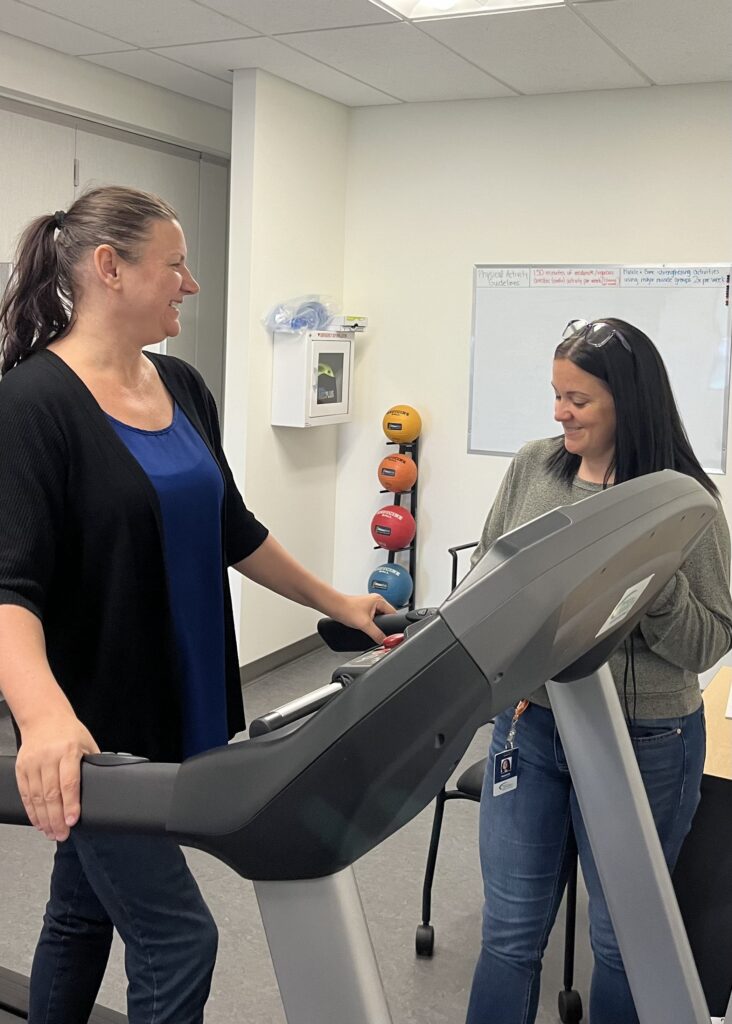
— Photo supplied by Rajeanne Bianca
A Fort McMurray clinical exercise specialist aims to help her community tackle mental health issues in an effort to get them more physically active with support from RhPAP.
Rajeanne Bianca, who also works with the Wood Buffalo Primary Care Network (WBPCN) as a behavioural health consultant and PCN clinic coordinator, recently completed courses eligible for funding through RhPAP’s Rural Education and Advanced Learning (REAL) Program.
“Given the uniqueness of Fort McMurray and all the challenges we’ve had, it’s apparent that mental health has become quite a concern since the fire and floods and everything,” says Bianca. “I was recognizing that patients were having difficulties making lifestyle changes when there were mental health challenges impacting them.”
In her role, Bianca helps patients with chronic diseases get active safely.
“I do more of a clinical lens when it comes to exercise, so I take a full intake with them and check on risk factors that might put them at an elevated risk of having an issue with exercise,” she explains.
“For instance, if somebody had a heart attack and they have had heart surgery, they are not exactly sure how to get started safely.”
During that rehabilitation, Bianca found that mental health challenges hindered some patients’ progress in developing an effective exercise program. So, before she could focus on the exercise, she needed to discuss these barriers.
“Even though I was booked for an exercise consult, the conversations tended to lead in different directions,” she explains. “For example, they are not going to go exercise if they don’t have stable housing.”
So, Bianca enrolled in online classes through the Kelowna College of Professional Counselling, which focused on psychology and ethics, addictions and recovery, and an introduction to teletherapy.
The first course focused on building rapport with clients.
“I learned more about how to build those relationships with clients that maybe aren’t as easy. Some people just open right up, whereas others are maybe a bit more guarded. That course taught some techniques like empathy and about checking your own self awareness and what kind of biases you might carry into your appointments and how to set those aside.”
Another course looked at addictions and recovery.
“In one of the assignments, we had to attend an Alcoholics Anonymous meeting and that allowed me to gain exposure to what somebody who’s trying to get sober does to stay sober,” she explains.
“Even though I won’t see a client and work with them [specifically] on addictions, I may see clients that may have a substance-use disorder and were referred to me because they had a heart event or something to that effect.”
Bianca says enhancing her education helps support her clients’ overall needs.
“It talked a lot about that wraparound approach and looking at social determinants of health. That’s more of the area where I would be assisting is making sure they’ve got what they need to try to get well and connecting them with resources in the community.”
Her final course explored virtual services, something she says is an important option especially for patients based out of Fort Chipewyan or Fort McKay who don’t want to travel or don’t have the ability.
“The course did a deeper dive into the background on teletherapy and how to build that rapport over the phone since you can’t see the body language. It was a good course highlighting ways to establish rapport with clients when they’re not sitting in front of you.”
Bianca appreciates that RhPAP provided $1,500 in funding toward the cost of the courses through REAL.
“Continuing education is pretty important for two reasons: I have to do it to maintain my certifications, but also it allows me to stay on top of what the newest research is.”
Bianca says she hopes to take additional courses down the road.
“I’m really grateful for that opportunity to have access to RhPAP’s financial support. It’s been wonderful being able to access that funding and help cushion what’s coming out of my pocket.”
RhPAP’s REAL funding assists rural health professionals including nurses, midwives, nurse practitioners, and other allied health professionals to access continuing professional development and education opportunities that help enhance the healthcare services they offer in their communities.
REAL application information is available at RhPAP.ca/REAL.
